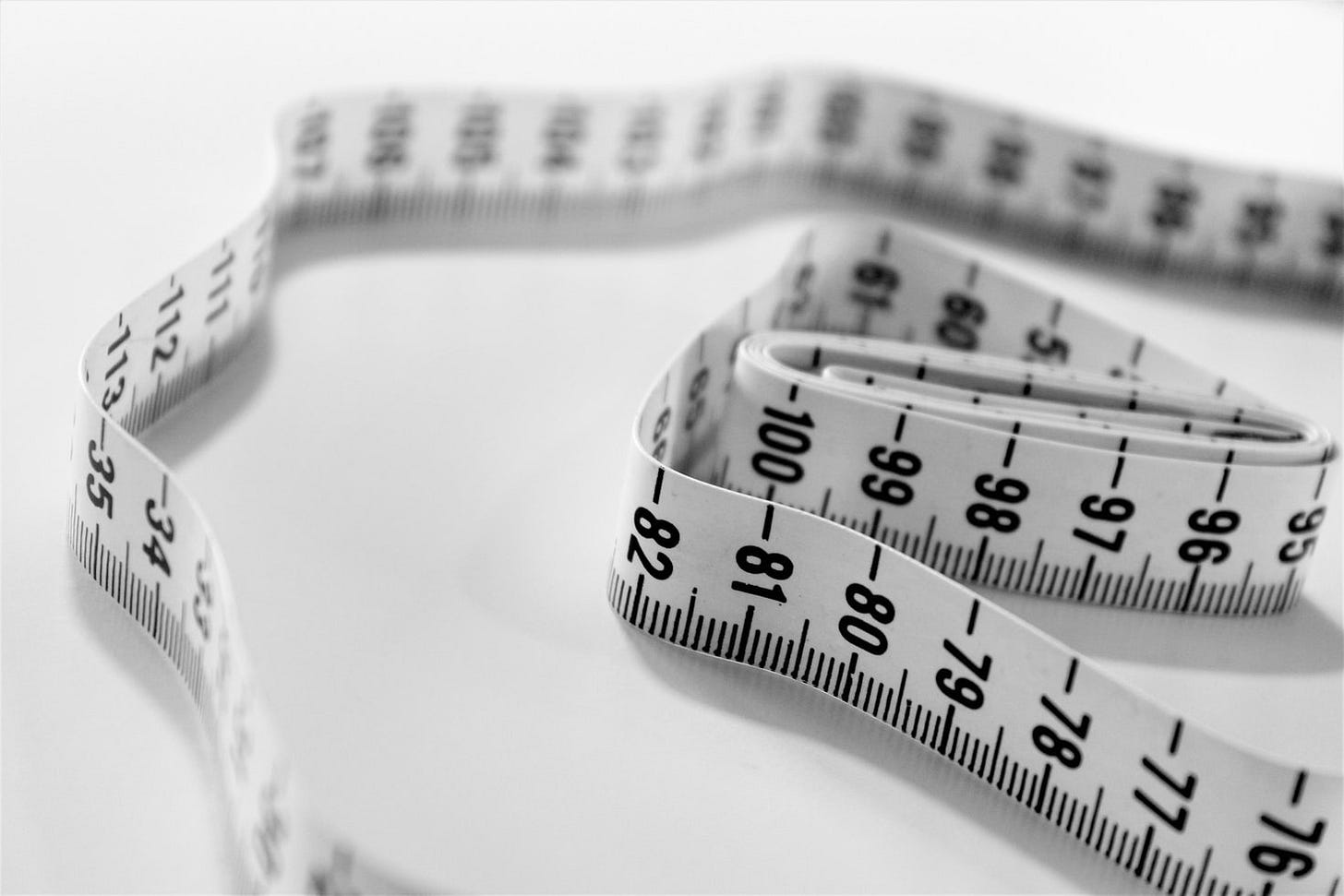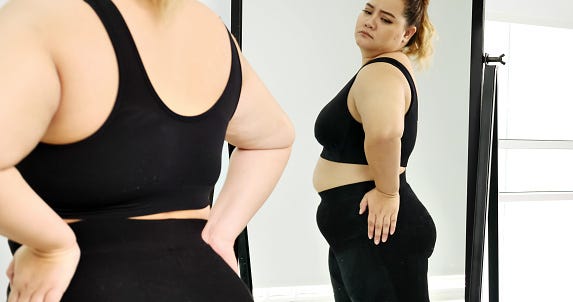Positively Dangerous?
For many, the Body Positivity Movement has allowed for important recognition and visibility, but has it become a convenient crutch for some?
In many ways, I guess it was a matter of conditioning. I was brought up in societies that all looked down on big people. We the fat were viewed as sick, lazy and lacking control. In fact, making fun of large people - even in public settings - was completely normalized.
Growing up obese, I felt the world's general disdain for people like me almost daily. Add in a pretty rough home life, coming to terms with being gay and a loner, and my cycle of issues would be one of eating the pain and making things worse.
With this kind of background as a reference point, it used to strike me as really strange when I started to see obese people on TV talk about how they love their bodies and don't want to change.
I was in the same boat as them, except I was hating myself thoroughly while these really large individuals were expressing an actual joy of being exactly how they were. Seemingly comfortable in their own skin. Up to that point in time, I had never even considered that this was an option.
Although it was quite the cultural adjustment, my first few looks at what I would later come to know as the Body Positivity Movement had the desired, positive impact on me.
For the first time in my life, there was a message being shared with the world that individuals like me are a worthy part of society. A group of marginalized people who deserve the same considerations and respect that people of any other size get effortlessly and without a second thought.
What I didn’t know then is that this Body Positivity Movement had been around for a while at the time I discovered it, and that its original message had begun to touch on some controversial territory.
Happy with you
Body positivity is the necessary retaliation to the traditional shaming that I myself was exposed to in my younger life and that sadly is still with us today in many forms. It is the drive to normalize how society sees and treats all kinds of bodies.
Although the seed for what was to become the Body Positivity Movement was planted in the Victorian era, it really started to gain traction in the late 1960s.
The movement was originally aimed at achieving full inclusivity for people with certain physical features that were more or less permanent such as scars, birth marks, and physical disabilities. It did and continues to do so today by challenging unrealistic ideals of physical attractiveness.
As time went on, the movement began including things such as skin pigmentation disorders, grey hair, hair loss and many other visual markers of the ever-varied human form.
Soon, more qualities were included such as race, sexual orientation and gender expression.
The key takeaway here was that the positivity was aimed at characteristics that very little – if anything could be done about. The idea was to normalize what for a long time was seen as something to look down, feel sorry for or even fear.
But is carrying a large amount of fat on the body one of those?
When self-love becomes danger
This may not make me a lot of friends, but obesity is not a feature that can’t be helped. In all but the smallest of handfuls of individuals, changing weight and body composition is achievable and downright necessary.
I have been on both sides of this mirror.
When I felt better about myself after seeing people on TV proclaim how they love themselves as they were, it was because deep down inside I was longing to be accepted and not looked down on by the world around me. To this end, the inclusivity push was immensely helpful and healthy.
However, I admit that there was also a part of me that rejoiced at the prospect of not having to do anything about my growing weight problem. I saw body acceptance and self-love as permission to always remain in my current state and somehow be ok with it.
Now certainly not all large individuals feel this way, but for the many that do, this is where the whole subject enters murky water.
Loving yourself exactly as you appear in the mirror is incredibly important. No matter what state you are in – to have a positive view of yourself is proven to be a powerful mental anchor like no other.
But when the end results of the aspect you are embracing are disease and premature death, there is nothing positive about it, no matter how many plus-size Insta-starlets proclaim that it is.
The argument that the type of positivity shown on social media is to assert oneself may be valid, but there is this side effect of thousands, if not millions of followers who are influenced by what they see.
To me, it is equally wrong when celebrities or social media influencers glamorize being super skinny, clearly steroidal or morbidly obese. In fact, I’d go as far as attaching warning labels on some of these accounts such as the ones we see on cigarette packages.
Though that may sound a bit extreme, let’s ponder this sobering fact:
None of those individuals post things for your health.
Everyone gets sick, no?
Something I hear a lot from what I call the ‘obesity-positive’ team is "well, skinny people get sick and die too" - an entirely realistic and correct statement. However, that's a terrible oversimplification when it's used as a direct comparison.
Everyone has heard of the super-fit person dropping dead while out on a run. Yeah, it happens. Like with everything else in this world, the difference between life and death can be looked at as a game of chances and making the right choices to increase our odds of a favorable outcome.
The end of that road is never in doubt - what is open to our influence is what happens between now and then.
People who are in their normal weight range and those that are ‘fit’ have far better health markers and can expect a much higher quality of life than their overweight or obese counterparts. That's not anecdotal or a seed of philosophy. That's just cold, hard science with more evidence to back it up than could possibly be summed up in any one article.
I’m not sure who coined the term “Obesity is the new smoking”, but even a passing glance at how being in that condition relates to disease and death statistically, and it’s easy to see how this is sadly true.
One can absolutely decide to stay overweight or even obese, but the chances of something bad happening to your health if you choose to do so increase with every pound of fat you carry. If that is acceptable to you – that too is ok; after all, body positivity is about self-perception and removing the weight of others’ judgements.
But then where does that philosophy end? Do we normalize alcoholism? Drug abuse?
The bottom line
A person’s value should not be tied to their physical appearance. No one should have to seek validation or base their self-worth on other people’s superficial opinions.
All bodies and their many features change over time. Most, if not all of us will have body acceptance issues of some kind or another in our lifetimes.
There is nothing wrong with fully embracing who you are, including your size. The problem is believing that this philosophy extends to being complacent about increased risks of health problems.
Real self-love is not just beholding and loving who we are in the present moment, but it’s loving ourselves enough to change for a better chance at life.
Until next time,
We can be beautiful and mindful at the same time.
Got a question or comment? Drop me a line in the comments section. I always love to hear from you.
Also, why not share this post with someone you think may find it interesting?






You did a great job on this article. It's such a touchy subject. Yes, people should love them selves, but they also need to be healthy. Being healthy is a battle that a lot people fight every day, even people who are considered to be a healthy weight.